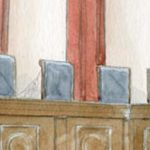HIV privacy, guilty pleas, and bribery convictions

Share
This week we highlight cert petitions that ask the Supreme Court to consider, among other things, whether inmates have a constitutional right to privacy in their HIV status, whether a capital defendant’s guilty plea was knowing and voluntary, and what the government must show to convict of bribery.
Payne v. Taslimi involves an inmate’s claim to a constitutional right to privacy in his HIV status. When inmate Christopher Payne was at his bed in an open dorm, Dr. Jalal Taslimi told Payne that he had not taken his HIV medication that day in a voice loud enough that others could hear. The U.S. Court of Appeals for the 4th Circuit affirmed the district court’s dismissal of Payne’s complaint alleging violation of his constitutional right to privacy. The 4th Circuit reasoned that Payne did not have a reasonable expectation of privacy in his HIV status because prison staff knew of the disease, because HIV is a “communicable disease” that could spread in the prison, and because the location of the disclosure made it “difficult to ensure others would not hear.” In his petition, Payne argues that the 4th Circuit departed from how other circuits have ruled on this issue, which affects thousands of inmates.
In Ohio v. Brinkman, the Supreme Court of Ohio vacated George Brinkman’s guilty plea for murder – for which Brinkman had received a sentence of death from a three-judge panel – and remanded the case to the trial court. In considering whether Brinkman’s plea was valid, the Supreme Court of Ohio confined its review to Brinkman’s plea hearing. At that time, the trial court had not advised Brinkman of his rights to confront witnesses and to have the prosecution prove his guilt beyond a reasonable doubt. The trial court did advise Brinkman of these rights, however, at a subsequent hearing. In its petition, Ohio argues that Brinkman’s plea was valid in light of the entire record of his case and that state courts are split as to whether failures like the ones at Brinkman’s plea hearing require that a plea be invalidated.
In Roberson v. United States, David Roberson asks the justices to review two elements of his conviction for bribery. Roberson was a vice president of government relations of a company that the Environmental Protection Agency blamed for pollution at a site in Alabama. As portrayed in his petition, Drummond worked with Oliver Robinson upon the advice of counsel for Robinson’s assistance in a community-outreach program. Robinson, a part-time state legislator, also conducted advocacy and community outreach as a consultant through a foundation. In part through these efforts, the EPA dropped its regulatory action. Roberson maintains that the payments to Robinson’s foundation were not bribes because they were not explicitly linked to any official action and that Robinson merely expressing support does not constitute official action. He argues that the U.S. Court of Appeals for the 11th Circuit did not properly apply two past Supreme Court precedents construing the requirements of bribery.
These and other petitions of the week are below:
Warsaw Orthopedic, Inc. v. Sasso
21-540
Issue: Whether a dispute raises substantial issues of federal patent law when its resolution necessarily depends on patent-law determinations regarding claim scope and validity.
Alphabet Inc. v. Rhode Island
21-594
Issue: Whether the “risk factors” disclosed in a securities filing must disclose only future risks or must also disclose whether a risk has come to fruition in the past.
Ohio v. Brinkman
21-603
Issues: (1) Whether the due process clause of the 14th Amendment to the United States Constitution prohibits review of the entire record to determine whether a guilty plea was knowingly, intelligently, and voluntarily entered; and (2) whether the Supreme Court should grant certiorari to resolve the conflict among the courts on whether the failure to strictly adhere to the advisement of rights in Boykin v. Alabama should result in the automatic reversal of a guilty plea.
Roberson v. United States
21-605
Issues: (1) Whether, in a bribery prosecution based on issue-advocacy payments that would otherwise enjoy First Amendment protection, the government must prove that the payments were explicitly linked to official action; and (2) whether a jury must be instructed that merely “expressing support” for a policy cannot support conviction under the federal bribery laws.
Payne v. Taslimi
21-617
Issue: Whether inmates have a constitutional right to privacy in their HIV status, as the U.S. Courts of Appeals for the 2nd, 3rd, and 6th Circuits have held (subject to legitimate penological interests), or whether there is no such right, as the U.S. Court of Appeals for the 4th Circuit ruled in this case.
The post HIV privacy, guilty pleas, and bribery convictions appeared first on SCOTUSblog.
